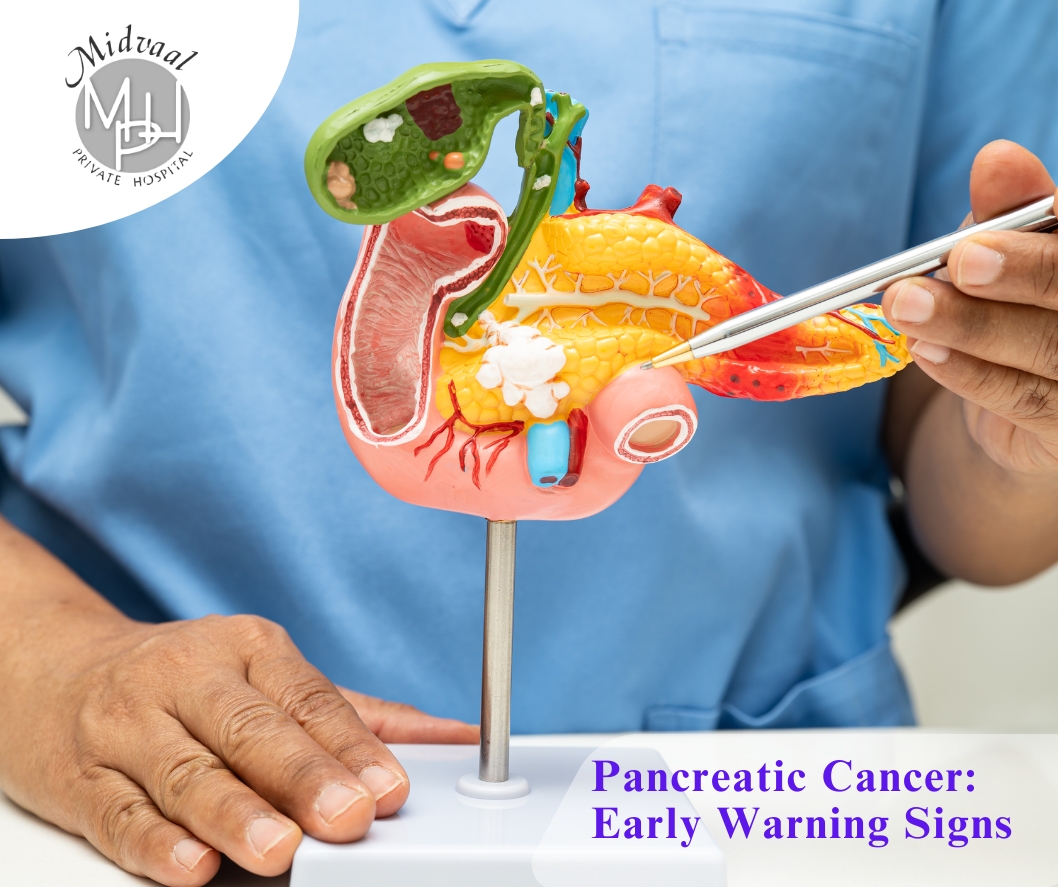Introduction: Why “early” matters
Catching pancreatic cancer early is challenging—but not impossible. Subtle changes like unexplained weight loss, persistent upper-abdominal pain, new-onset diabetes, or painless jaundice deserve prompt medical attention.
At Midvaal, our care team guides you from first symptoms to fast referrals for imaging and specialist assessment. If you’ve noticed ongoing digestive discomfort, dark urine, pale stools, or itchiness without a clear cause, don’t wait. Early evaluation can open more treatment options and improve outcomes. Book a symptom assessment
What the pancreas does (and why symptoms can be subtle)
The pancreas helps digest food and regulates blood sugar. Tumours can grow quietly at first, so early signs often look like everyday issues—indigestion, back discomfort, or mild appetite loss. Pay attention if symptoms persist, progress, or cluster together.
Early warning signs to take seriously
-
Upper-abdominal pain that may spread to the back, worse after meals or when lying down
-
Unexplained weight loss or loss of appetite
-
New-onset diabetes (especially in adults without typical risk factors) or suddenly harder-to-control glucose
-
Painless jaundice (yellowing of the skin/eyes), dark urine, pale/greasy stools, itchy skin
-
Persistent indigestion, nausea, or a feeling of fullness after small meals
-
Fatigue that doesn’t improve with rest
Call Midvaal urgently if you notice jaundice, dark urine, or severe, persistent pain. Contact our GP team
Who is at higher risk?
-
Family history of pancreatic cancer or certain genetic syndromes
-
Smoking history
-
Chronic pancreatitis
-
Obesity or long-standing type 2 diabetes
-
Age 55+ (risk increases with age)
If you have multiple risk factors, ask for a risk review with a Midvaal clinician. Learn about Gastroenterology
Quick self-check before you book
Answer yes or no to each:
-
Have you had unexplained weight loss in the last 1–3 months?
-
Do you have ongoing upper-abdominal pain that spreads to the back?
-
Any yellowing of the eyes/skin, dark urine, or pale stools?
-
New diabetes or suddenly higher sugars without clear cause?
If you answered yes to any, schedule a same-week review. Book now
How Midvaal investigates symptoms (what to expect)
-
Clinical assessment (history, exam, baseline bloods).
-
Imaging when indicated—often ultrasound first, followed by CT/MRI.
-
Specialist referral to Gastroenterology/Oncology for advanced tests like EUS or biopsy if required.
-
Next steps: a personalised plan and, if needed, rapid referral to our oncology partners.
Red-flag symptoms: seek care immediately
Yellow eyes/skin, dark urine, pale/greasy stools
Severe, constant upper-abdominal pain or back pain
Unintentional weight loss plus any of the above
Call Midvaal for urgent guidance.
FAQs
1) What are the earliest signs I should not ignore?
Upper-abdominal/back pain, unexplained weight loss, new-onset diabetes, painless jaundice, dark urine, pale stools, persistent indigestion. If symptoms last longer than two weeks—or jaundice appears—book a review.
2) If my blood sugar just went up, could it be related?
Sometimes. New or suddenly difficult-to-control diabetes can be an early clue, especially with weight loss or abdominal pain. Arrange a check-up with our GP team.
3) What tests might I need?
Your clinician may recommend ultrasound, CT/MRI, and, if indicated, endoscopic ultrasound (EUS) or biopsy. We’ll guide you through each step and coordinate referrals.
Gentle medical disclaimer
This article provides general information and is not a diagnosis. If you’re worried about symptoms, please seek medical care promptly.





